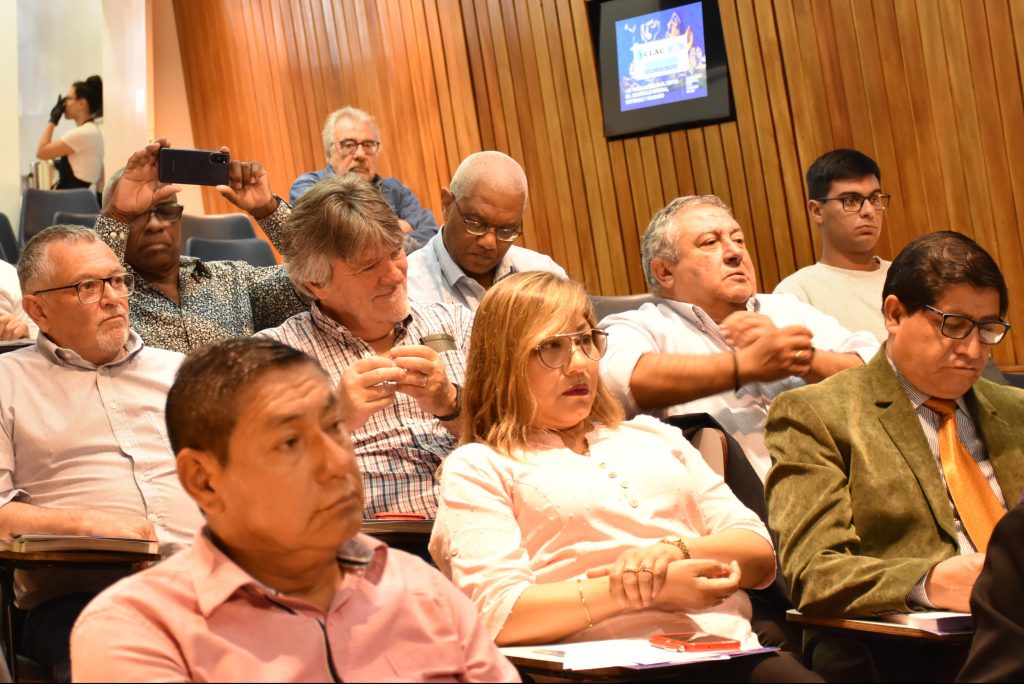Represented by the Latin American Federation of Culture and Social Communication Workers FELATRACCS, the Latin American Federation of Banking, Insurance and Related Services Workers FELATRABS and the Federation of Latin American Workers of Commerce, Offices and Private Service Companies FETRALCOS, convened by the Latin American Coordinator of Organizations affiliated to the CLAC-WOW World Organization of Workers.
The purpose is to develop a day of reflection, exchange of ideas, debate and conclusions, considering it their duty to express out loud their deep concern about the confluence of the economic and geopolitical crises, which profoundly affect the world of work, especially in the southern countries, and whose effects are manifested in high inflation in the prices of food, energy and other basic services, simultaneously with the reduction of wages, a situation that is creating inequality, social fragmentation and a disintegration of the forms of work and workers‘ organizations, imposing a type of society where the human is less and less valued.
Faced with this situation, CLAC-WOW considers that it is up to world society and national and international organizations to assume the share of responsibility that corresponds to them as a social, legal and moral duty in the face of events related to labour problems, worker organizations, international politics, human rights, the environment, workplace violence and sovereignty, among other issues that must appear on the day-to-day agendas as part of a task that concludes with achievable programs where workers become the centre of comprehensive, sustainable development and solidarity that humanity demands.
CLAC-WOW does not exempt itself from the responsibility that corresponds to it as an organization whose union and trade union work is based on integral humanism. In this sense, as one of the conclusions of the meeting held in Buenos Aires, Argentina, it maintains that today’s globalized world is experiencing a coexistence of the end of something, but that it still does not envision the beginning of something different, “it is a change of civilizational scope that to a large extent is determined by the transformation of the model of the economy and industrial society towards what in very ambiguous and confusing terms has been called post-industrial or postmodern society”. Consequently, it is time to build a new perspective, new visions to assume the world that opens up to us in this present and immediate future. “We frequently hear that the job crisis is due to technological development due to its most visible effects on unemployment and job insecurity, but if we analyze more carefully we see that the causes of the new problems lie in the subordination of science and the technique to the strategies of centrality of power at a global level that fight for greater control of the spaces of social autonomy and concentration in the appropriation of wealth”.
Under these conditions, a new working class is being shaped. Continuing to cite a working class in ideological or merely corporatist terms leads to losing all sense of reality and, therefore, to lose all ability to participate effectively in modifying it in favour of all workers. We must accept the real working class, the one made of flesh and bone, the one that lives the drama of its survival every day, its dignity run over and humiliated, the one that is debated in multiple situations and in increasingly complex and varied problems. Let us think about the dignity of work and of the human being. Let us think about the face of someone who has a job, but for whom it is unpredictable whether or not to keep it; in the face of the unemployed who already represents the majority of the economically active population; in the face of surviving day by day in the underground of the informal economy; in the face of those who suffer critical poverty and critical marginality: in the young person who no longer has hope for the future and personal progress. That is why we interrogate, question and challenge all the trade unionism established in the region. To the extent that we have awareness and political will, we will be able to assume other forms and contents in our organizations, capable of responding to the utopias of the working class, without losing their own identity and their own reason for being.
CLAC-WOW is concerned about the situation of ungovernability within a complex world of internal and international factors that do not make it easy to move towards truly democratic societies and not pseudo-democracies. We have to be alert to have in our imaginary that one of the characteristics of democracy is transparency in the debate and solution to all the problems that affect society and the agreement that freedom requires above all that there is no type of taboo topic or problem that cannot or should not be touched upon. The issue of Human Rights cannot remain in the inkwell of good intentions. These constitute a set of fundamental rights and freedoms for the enjoyment of human life in conditions of full dignity, and are defined as intrinsic to every person by the mere fact of belonging to the human race. The world scene and especially in our region is eclipsed because the economic crisis has brought to light more serious social, political, cultural, ethical and spiritual aspects of current human society. There is a crisis of civilization and among its causes are climate change, environmental degradation and other extreme phenomena that harm nature. Added to this are epidemics, diseases, water scarcity, new multinational trade models that use cheap labour to increase their economic benefits, while the lack of public policies to promote employment and social protection is noted.
In the same way, CLAC-WOW assumes its corresponding duty as a workers‘ organization in relation to workplace violence. In relation to this problem, “it is necessary to develop and implement a sustained strategy in the most relevant challenge to face since, considering the characteristics and complexity of the problem, it cannot and should not be addressed with circumstantial actions. Regarding this delicate aspect of working life, it should be borne in mind that fear and ignorance are a consequence of workplace violence, the lack or rupture of solidarity ties and extreme competition without clear rules in labor organizations are contextual factors that favor or facilitate the abusive exercise of power, the absence of mechanisms or procedures for reporting and protection measures for the complainant and often impunity”.
Finally, CLAC-WOW declares that it feels strengthened after this process of reflection and debate and, convinced of making new efforts to affirm the current of Christian unionism in Latin America and the Caribbean, to rescue the path started with the foundations of the social doctrine of the church with the incorporation of the thought of Pope Francis expressed in different documents. Our cry is not enough, neither crying nor anger, let us keep walking because we believe in people and because we will overcome defeat.
Buenos Aires, Republic of Argentina, 22 November 2022
Roberto Mejía Alarcón
FELATRACCS
Maritza Chireno
FETRALCOS
Arturo Quinoa
FELATRABS
Source: http://www.wowlatinoamerica.org/noticias_det.php?Itemid=3632 (original Spanish)





